Due to huge blind spot and hubris, Eritrea’s ruling party (PFDJ) considers its weakest link—foreign policy—its strongest asset. But catalog the outcome of its foreign policy since 1991–its policy towards Sudan, Yemen, Ethiopia, USA, Djibouti, Qatar, UAE, —and all you see is a debris of blunders engineered by self-conceit. This, I submit to you, is not just the result of One Man Rule but also the ideology of “pragmatism.”
Unlike the rest of its blunders which are deviations from its own National Charter, the miscalculation of its foreign policy is baked in the Charter itself. In other words, the problem is not bad execution of a good principle; the problem is excellent execution of a bad principle (pragmatism.) The source of our 30 years of bouncing from one disaster to another is this:
Establishing Regional and International Cooperation Our foreign policy, as an extension of our internal policy, should be based on preserving our national interest, working in the interests of peace and stability in our region and in the world, and enhancing cooperation in all areas with all governments and peoples. In short, our foreign policy is that of peace and non-alignment. First, we must establish good neighborly and peaceful relations with our neighbors and the countries of our region, based on mutual interest and mutual cooperation. Problems related to peace and stability cannot be confined to within our borders. In order to preserve the peace and harmony we acquired after a long struggle, it is essential that we strive for peace and stability at both regional and global levels, notwithstanding our limited capabilities.
How often does the Eritrean government get its foreign policy wrong? Always. How many times is the right lesson learned? Never! Don’t be surprised by what’s coming in 2025: it’s part of #PFDJ’s “culture” of pragmatism. Let’s recap out stumbles, missteps and adventures since 1994:
1. Sudan. It’s 1994. Sudan’s ruling party, National Islamic Front (later National Congress) had an Islamist military boss, Omar Al Beshir, and an Islamist ideologue, Al-Turabi. The latter was a media darling being quoted for this and that in his Sorbonne University polish. The two decided to host Bin Laden who, before his move to Afghanistan and points beyond, was supporting Eritrea’s armed Islamists parties.
Perfectly valid reason to go to war. If you can’t fight people armed to overthrow you, whom are you going to fight?
PFDJ did more: it publicly announced–per The Economist magazine–that its goal is not just to defeat but to overthrow the Sudanese government. Then it turned over the Sudanese embassy in Asmara to Sudanese opposition!
Oh, well, 1994. Eritrea had only been a recognized State for one year. Growing pains.
How it ended: the military leader of Sudan, Omar Al Beshir, emerged stronger, sidelining al-Turabi. The assortment of Sudanese opposition groups got nothing. Al Beshir went back to retake the Sudanese embassy in Eritrea and the Presidents of Eritrea and Sudan had an off-and-on relationship for decades until Al-Beshir was overthrown by popular Sudanese uprising in 2018, who were overthrown by two of Al-Beshir’s generals.
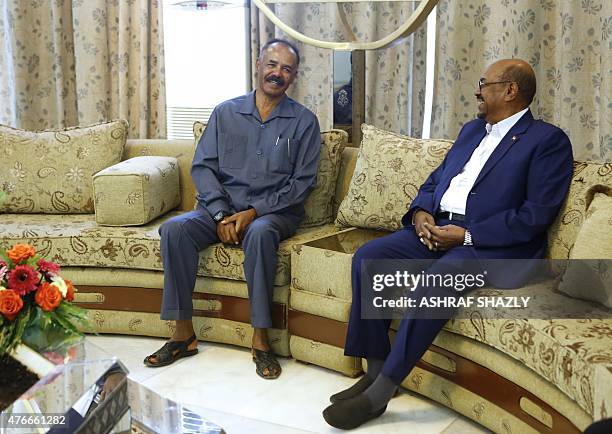
Sudanese President Omar al-Bashir (R) sits with Eritrean President Isaias Afwerki (L) during a meeting following the latter’s arrival in the capital Khartoum, on June 11, 2015. AFP PHOTO / ASHRAF SHAZLY (Photo credit should read ASHRAF SHAZLY/AFP via Getty Images)
2. Yemen. it’s 1995.
“In December 1995, Yemen fought a brief battle with Eritrea over Greater Hanish Island, located just north of the Bab al-Mandab. At dawn on December 16, a clash between the forces erupted and within two days Yemeni forces were defeated. The crisis erupted into an air and sea battle in which 12 Eritrean and 15 Yemeni soldiers were killed. Eritrean forces captured an estimated 185 Yemeni soldiers, but released them after two weeks.”
What could have possibly caused this?
“Early in 1995, a Yemen-German company was granted a license to operate a scuba diving school on Greater Hanish Island, and Yemeni troops were sent to guard the company’s equipment. Eritrea protested Yemen’s move.”
Oh, well, 1995. Eritrea had only been a recognized State for two years. Growing pains.
How it ended: It was a 3-day war. Casualties were relatively low. The war was about land, and the potential for oil reserves and resorts and fishes. In 1999, the Arbitrators ruled in favor of Yemen, which we promptly accepted. Then we spent 20 years mentioning how unjust the arbitral ruling was. Yemen got the support of the Arab League. Eritrea got the support of Ethiopia, with whom we had a mutual defense agreement, proving that our friendship was forever and ever and ever…
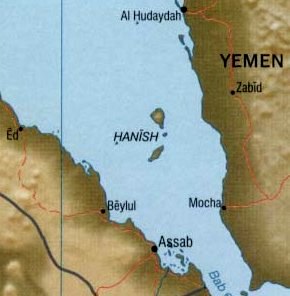
3. Ethiopia. It’s 1998. We had a war. The War in Ethiopia was about borders. And economic policy. And industrial policy. And political supremacy. It was very far from the Suez Canal so it wasn’t a 2-day war. It was 2 years of grinding war–three battles and many skirmishes–with tens of thousands in casualties.
Oh, well, 1998. Eritrea had only been a recognized State for five years. Growing pains.
The two-year war was followed by 18 years of Cold War. Ethiopia allied with the U.S. while Eritrea allied with an assortment of armed, mostly ethnic-based, Ethiopian opposition groups whom it hosted and their media, whom it funded. Hundreds of thousands of Eritreans were exiled during this so-called “no war no peace” period.
How it ended: the thousands of armed Ethiopian groups went back home and they will probably be armed to fight us in the next war.
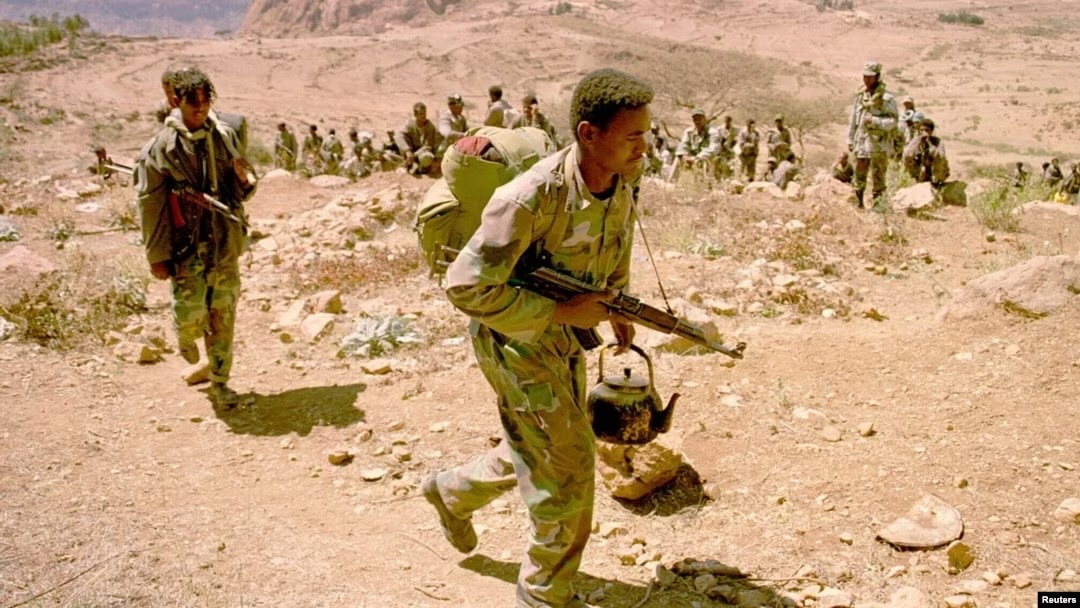
4. USA. It is 2008. The relationship with the U.S. was strained in 2001 when PFDJ’s “Operation Roundup Everyone” nabbed two U.S. embassy employees but it was muted because of the War on Terror (WoT) which also started in 2001 and is likely to last to the End of Times. Eritrea, which had faced and defeated Sudan-supported Islamists years earlier, was a very willing member of the US’s Coalition of the Willing (which had nothing to do with terrorism), having been courted by one of the signatories of the “Project for the New American Century (PNAC)“, Donald Rumsfeld, now a Secretary of Defense. A lobby firm was hired, articles circulated, American ships docked in Massawa all to show the Indispensability of Eritrea in the War On Terror. Nothing ever came of those but at least things weren’t getting worse.
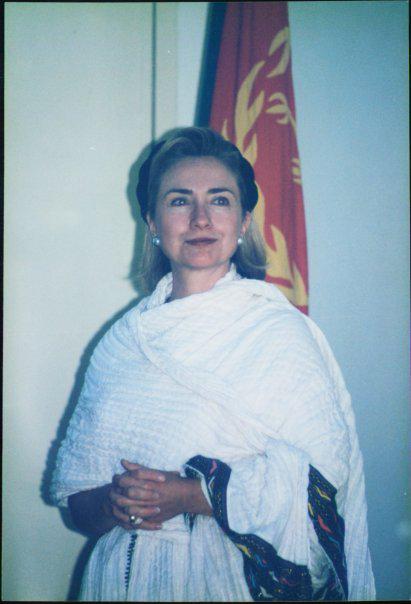
Then came Obama and his State Department(Clinton) and thus was born our president’s re-evaluation of his world view, including the Project for the New American Century. America is bad news. It’s helping Ethiopia cheat in the 2005 elections; it’s ruining everything in Somalia; it’s helping Ethiopia cheat on the court ruling. You have heard it: it is the prologue of every interview with Eritrea’s President Isaias Afwerki since 2008: Huntington, Fukuyama, Special Interest Group, Hegemony, Unipolar. The PNAC paper announcing American Supremacy was written in 1997, but Isaias discovered it was bad when he concluded he was not going to benefit from it. Pragmatism!
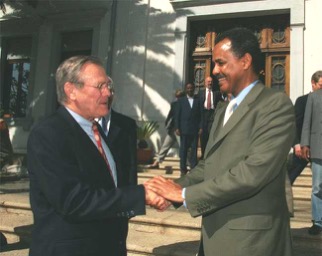

Since then, Eritrea’s foreign policy (which, as its charter says, is an extension of its domestic policy) has been whatever is the opposite of American policy. If this meant sanctions followed by more sanctions, so be it. Implement the ratified constitution? No, as a matter of fact we will kill it. ሕርር ድኣ በሉ! Unsuspend the private press? No, we will shut it down permanently. ሕርር ድኣ በሉ! Religious freedom for all including religious minorities? No! We will ban all but four: Sunni Islam, Orthodox Tewahdo, Roman Catholic, Evangelical Lutheran. ሕርር ድኣ በሉ! National elections? Maybe in 30, 40 years, maybe never: who is to say? ሕርር ድኣ በሉ! Improve your human rights record? Ha! Tell that to Saudi Arabia. ሕርር ድኣ በሉ!
How it ended: the relationship remains strained, awaiting a Disrupter. This is why they have so much hope for Trump. Of course, the “pragmatic” thing to do is to grant him land at Dahlak to build Trump Resort.
5. Djibouti, 2008.
A war’s proximity to Suez Canal is directly proportional to how long nations are allowed to have it. The Eritrea-Yemen war of 1995 lasted for 3 days, the Eritrea-Djibouti skirmish also lasted 3 days. It still had casualties and prisoners of war. But it was too close to the Suez Canal choke point of Bab el Mendeb for war to be allowed to go on.
Let’s not forget: the whole reason Eritrea became a country (an Italian colony) to begin with was because of Suez Canal.
Despite photographic and satellite evidence, Eritrea’s rulers kept referring to the skirmish as a “fabrication” for half of 2008 and all of 2009, until they were sanctioned by the UN Security Council in 2009. Despite the fact that this UN sanction was passed with only one single no vote (from Libya), the PFDJ still calls it unilateral and illegal. The war was about an un-demarcated border. And like the border dispute with Ethiopia, this one has resulted in no demarcation. Worse, not even a settlement: it is a conflict that has been merely paused. It is the “pragmatic” thing to do.
Well, at least we have Qatar as friends who can be counted on to be mediators and peacekeepers.
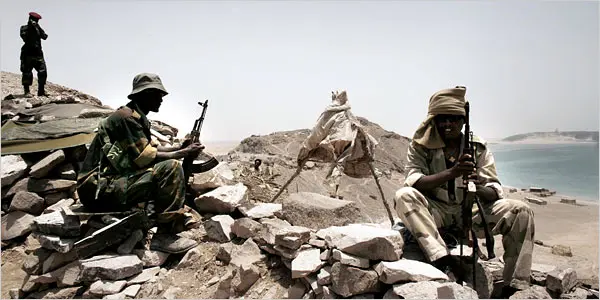
Eritreans and Djiboutians guarding their border.
6. Qatar, 2010:
How so nice of our bestie, the Emir of Qatar, to give us an alternative to UN, AU mediators; how so nice of him to place neutral peacekeepers along our common border with Djibouti, how considerate for taking this subject off the table and get the UN to compliment us for doing it. It is win-win: we get closer to a rich family member. The only way we will ever break up with Qatar is if we ever find a richer family member who loves us more and wants us to break up…
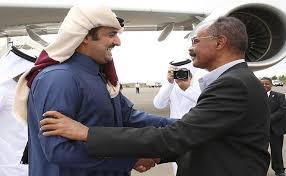
“Hold my camel milk!” said the kings and princes of Saudi Arabia, UAE, Bahrain and Egypt: we are severing all diplomatic and trade ties with Qatar. Want to join, they asked Isaias. What happened what did they do, asked Qatar’s long-time ally (and frequent Qatar Airways traveler) Isaias Afwerki. Four words, they said, Muslim Brotherhood, Al-Jazeera, Iran. We are also thinking of dropping a few more bombs on Yemen Houthis: they are too close to the Iranians. Wanna
join in our Sunni vs Shia war? Sure, what do I have to do? Condemn them and lease us Assab! They shook hands on it. Qatar was punished by all; complete embargo. It, understandably, promptly withdrew its peacekeepers from the Djibouti-Eritrea border. Our common border with Djibouti is back to the quiet no man land it was before the 2008 skirmish because we have other bloodier crisis now.
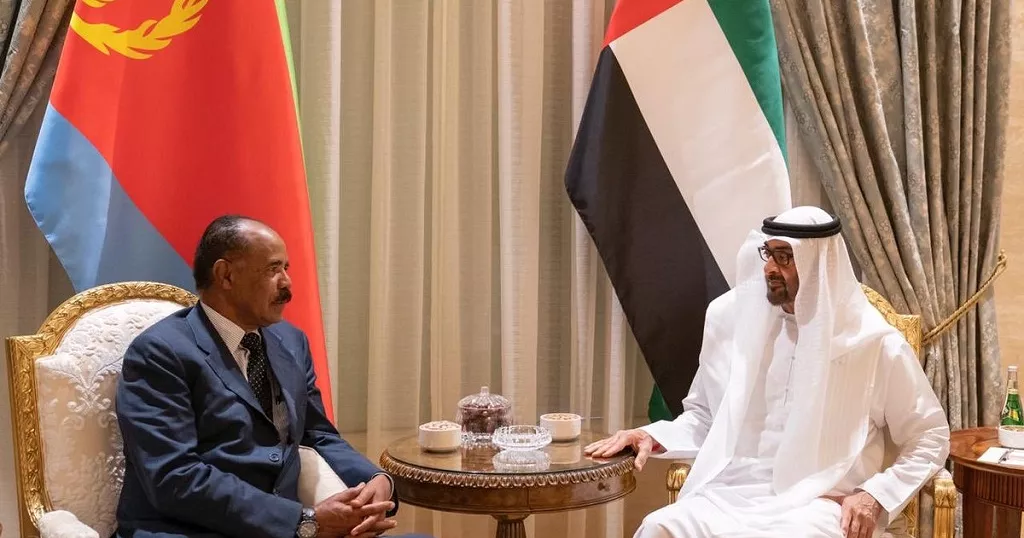
Eritrea gave Qatar a 10-point performance improvement plan (PIP) to modify its behavior.
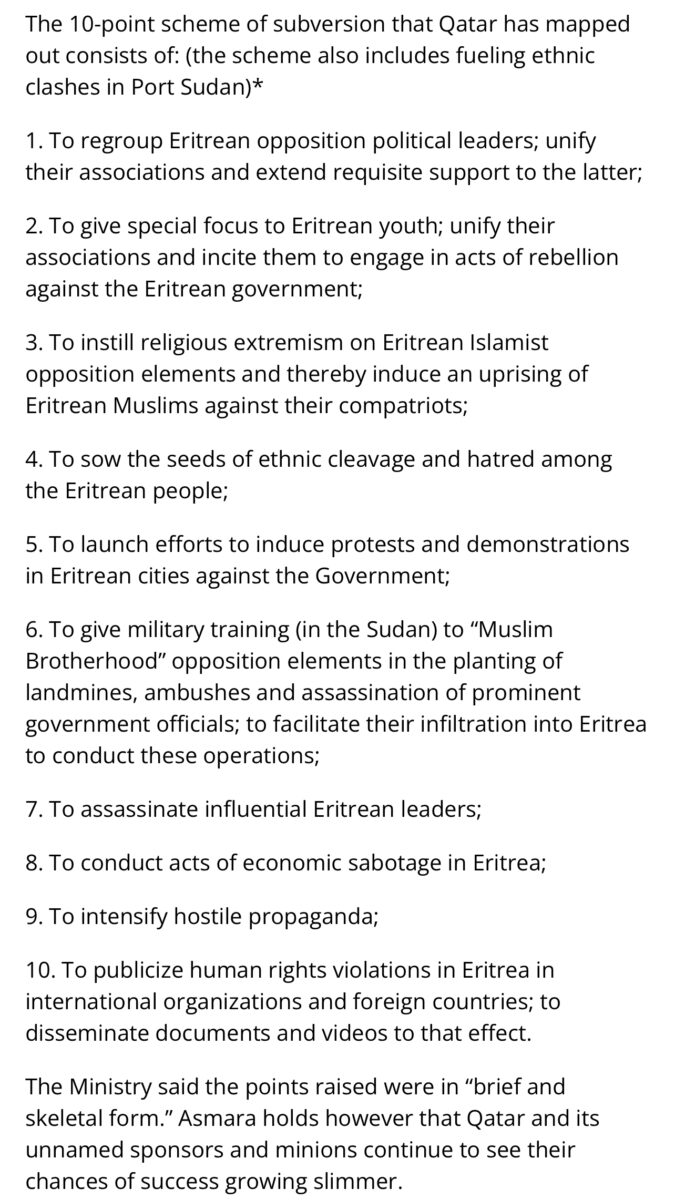
Meanwhile, the Eritrean ambassador to Qatar was recalled home and he said, “nah, I think I will stay here, I don’t want you to Omaro* me!” The Eritrean government responded: “fine, you can stay, it’s not like an ambassador does anything, anyway!” Astonishingly, he is still Eritrea’s ambassador to Qatar. It was the “pragmatic” thing to do when you need people for “ethnic balancing.” This is how unserious the Eritrean government is about foreign policy, and this is why all their ambassadors are Deans of Ambassadors: they are there for decades doing absolutely nothing except intimidating the Diaspora Eritreans.
(* Omaro, who joined the Armed Struggle in 1965, was Eritrea’s ambassador to Nigeria when he was recalled to Asmara and returned and was promptly arrested. He is over 80 years old and spent 60 years in the service of his country. But he is still in jail, incommunicado. Probably to teach America a lesson.)
7. UAE: 2021
Well, who cares about Qatar anyway. We have two Deep Pockets–Saudi Arabia and UAE–who love us and need us.
Then Joe Biden got elected as president. A month after his inauguration, UAE just abandoned Assab and the airstrip it had installed for its bombing sorties to Yemen. The war was a drain on the economies of both Saudi Arabia and Yemen, and Biden was not going to give them as free a rein as Trump had. So they just got up and left. How rude.
But wait, there is more.
Also the month Biden moved in to the White House, January 2021, the Gulf Cooperation Council (GCC), which had placed Qatar under blockade for 3.5 years, decided it was time to reconcile. Qatar could still have its Aljazeera, could still support Muslim Brotherhood and still had strong relations with Iran. All the issues that resulted in its blockade were there but it was time for reconciliation. What is Eritrea to do?
Once again, Eritrea followed the lead of Saudi Arabia and reconciled with Qatar. Pragmatism! But we are still not talking to UAE. The Emir of UAE is the personal Soros (የግል ወንድሜ) of Ethiopia’s Abiy Ahmed (and Sudan’s Hmeidti) inflating their ambitions, daring them to just take what they want, irrespective of laws and norms, despite the fact that he himself is an Emir because of his own country’s norms and traditions and rules of peaceful power transition.
This brings us to 2025: Ethiopia
8. Ethiopia: Again.
Since 2023, Eritrea and Ethiopia had been giving each other the silent treatment when the latter ended its regional war (with Tigray) not as conclusively as the former would have preferred. But it was Abiy Ahmed’s Fall 2023 series of speeches on existentialism (“No Sea, No Existence”) that got Eritreans to ask “what exactly are you saying?” He doubled down and tripled down: the Red Sea is as important to Ethiopia as the Nile. Deal with it: why do you think I have a Navy?
Things have been awkward ever since:
• the banning of Ethiopian Airlines
• the nationalization of their working capital which just so happens to be the size of the alleged damage inflicted by the airline on Eritrean passengers
• their mutually hostile semi-official media
• the absence of embassies or even delegation visits
• the PR of hosting opposition groups
• their opposing views on Somalia, Somaliland
• the fines for Eritreans if they overstay their visa
Conclusion
It’s not a great neighborhood and you can’t blame the PFDJ for all the ills of the neighborhood. Some of these conflicts and wars would happen no matter who was in charge of Eritrea. But not all of them. I submit to you that the reason they happen with the frequency that they do is due to two unique conditions: absolute power concentration in one man (Isaias Afwerki) and political ideology of the ruling party (pragmatism.)
Can anyone really argue that Eritrea’s foreign policy is the result of a deliberative body anywhere or is it Isaias and the Adi Halo walls? You know the answer, so don’t pretend you don’t: there is no functioning cabinet (there never was); there is no functioning parliament (there never was); there is no functioning political party institution (there never was.) This is why all Eritrean officials, except Isaias, are reluctant to be interviewed because they don’t know Eritrea’s foreign policy. If you recall, the last interview that the late Alamin Mohammed Seid, the Secretary of the PFDJ, gave was about Ethiopia, and why its stability is of paramount importance, nay, the most important thing to Eritrea….and he prefaced it by saying, “this is my personal opinion.” The Secretary of the Ruling Party could only speak by qualifying his speech as his personal opinion.
He died over three years ago and the position of “Secretary” is vacant because, let’s be pragmatic, there is no party to be secretary of.
It’s not just that Eritrea’s policy is the ruminations of One Man. By all accounts, he is a very smart man and by all accounts he actually thinks he is prioritizing Eritrea’s national interest. The problem is the ideology: pragmatism. And, yes, pragmatism is an ideology and yes, my dear PFDJ friends, it is the ideology of the West: Look up Peirce, James and Dewey. Pragmatism says there is no such thing as Reality or Morality in the abstract: it always depends on the context and the experience. You can only get to Reality by experimenting. ብግብሪ! So, what’s wrong with that? What’s wrong is that no experiences are identical. A TPLF threatening war and a PP threatening war are not identical. So whatever you learned from the era of TPLF threatening annihilation and destruction is not applicable to when PP threatens it. There are no moral absolutes: is arresting a 15-year old for 12 years right or wrong? It depends: we have to be pragmatic about this. There are no absolutes: just experiences and context which have to be experimented with. Every day.
Either the man has to go, or the ideology has to go, or both have to go. Otherwise, Eritrea will constantly relieve its version of Groundhog Day, except we call it Gobye (tortoise) Day in Eritrea.


Comment
Hey Saay,
What do you think of Shaleqa Dawit articles at Borkona ?
https://borkena.com/2025/01/29/ethiopia-and-eritrea-part-three-by-dawit-w-giorgis/
It would be a great service if you can synthesize his articles and provide a reply, as I believe he has done a compelling case to debunk our independence as a blunder of TPLF and Melles Zenawi.
The danger I see in his writing, if not challenged in legal and international, the ethiopians will use his argument to justify their claims for eternity.